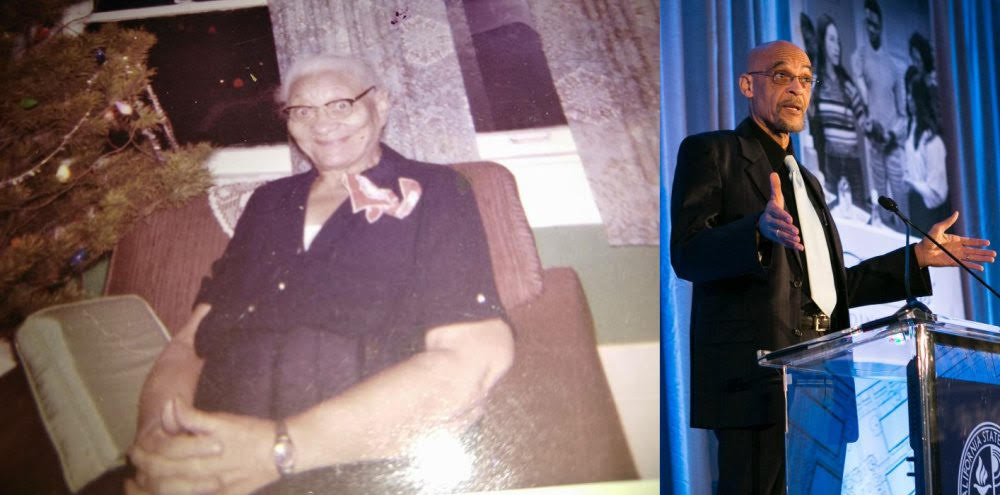Letter to the Editor: Reopening a window on the past to one’s ancestry

One of the great growth industries in America in recent years has been the study, research, and discovery of one’s ancestry and family heritage, then paying homage to those ancestors who did so much to ensure our well-being and success in life. The reopening of a window into one’s ancestry and family past can reveal much about who we are, where we are, and how we got here. In short, it’s an important measure of our lives.
For years, I longed to reopen that window regarding my maternal grandmother, Althea Brown. Her life (born in 1879 in Pike County, Mo.) in many ways embodied the essence of Americana. Her genealogy encompassed several Americana genealogies with her blend of Native-American, African American and Euro-American ancestry. She lived for many years in a city that typified, mid-20th century America.
Quincy, Ill., is a small Midwestern city nestled on the banks of the Mississippi River and in a region famously known as Mark Twain country. Abraham Lincoln often frequented Quincy. Today it is one of six cities designated the Abraham Lincoln National Heritage Area.
Reaching back six decades in remembrance of my grandmother was not simply a nostalgic longing to rekindle the fond childhood memories of her and the summers I spent with her in Quincy in the late 1950s and early 1960s. Nor is it to romanticize, a by-gone idyllic past. It is a remembrance of the unconditional love, warmth and kindness she bestowed on me and the importance that played in shaping my life.
The Quincy of that era was a near textbook small town. Neighbors knew each other, never locked their doors and sat nightly in the era before air conditioning was widespread on their front porches, sipping lemonade and fanning themselves furiously to ward off the sultry heat and humidity of an August night. They often sat there late into the night chatting, all the while keeping a watchful eye on me and other neighborhood children. Then we could stay outdoors into the night, playing all kinds of make-up games and catching lightning bugs with no fear of harm.
It was a modest, low-income working-class neighborhood. Nearly all the houses on that block and the surrounding blocks were tiny one- or two-bedroom houses that we fondly called shotgun houses. You could stand on the front of one and look straight through it to the backyard.
Grandma Brown, as she was affectionately known by the neighbors, was a true community nurturer and caregiver. The home on Chestnut Street she shared with one of her brothers, Uncle Phil, was always open to anyone who had a problem or issue and needed a receptive ear and helpful advice.
She was, like many in that era, intensely devout. There were three things I recall on the small nightstand by her bed — a small bowl with a pair of dentures, the Bible which she read every night and a Mason jar. She’d drop her spare coins into it. I was fascinated seeing the pennies and nickels fill up. This was in a sense my first lesson in saving, money management and even wealth building.
Family, to her, as many in that era, meant everything. I was proof of that in her love. Many of her children, dozens of grandchildren as well as her great and great great grandchildren experienced that same love and warmth. They are part of her remarkable legacy that enriches and spans the 19th, 20th and 21st centuries, and that will endure for decades to come.
Reopening a window on a bygone but never forgotten and always cherished past is more than just a personal labor of love. It’s a reminder that to know your past can serve as a crucial life guide to the present and future. One’s knowledge of their ancestry will always serve that vital need.
Finally, it’s another reminder that our ancestors are our giants whose shoulders we stand on. For that we owe them an eternal debt of thanks.
Thank you Grandma Brown and the countless other Grandma Browns who made me and us what we are.
Earl Ofari Hutchinson is an author, syndicated columnist and political analyst who lives in California. He is the author of multiple books on race and politics in America. The most recent are “The Obama Legacy,” “The Trump Challenge to Black America” and “From King to Obama: Witness to a Turbulent History.” He also is the host of “The Earl Ofari Hutchinson Show,” a news and public affairs radio show that features news, commentary, interviews and plenty of listener call in. The first hour focuses on national issues. The second hour focuses on local L.A. and Southern California issues and news. All set to a classical music background.
Hutchinson spent several of his childhood summers living with his maternal grandmother Althea Brown in Quincy. As the 60th anniversary of her death in 1964 approaches, he is paying homage in a tribute article to her and his fond remembrances of Quincy in the era of the late 1950s and early 1960s. He recently endowed a $1,000 annual Althea Brown Academic Achievement Award in her memory to John Wood Community College. It is to be awarded to a needy, academically achieving student. It is a 10-year annual endowment.
Miss Clipping Out Stories to Save for Later?
Click the Purchase Story button below to order a print of this story. We will print it for you on matte photo paper to keep forever.

